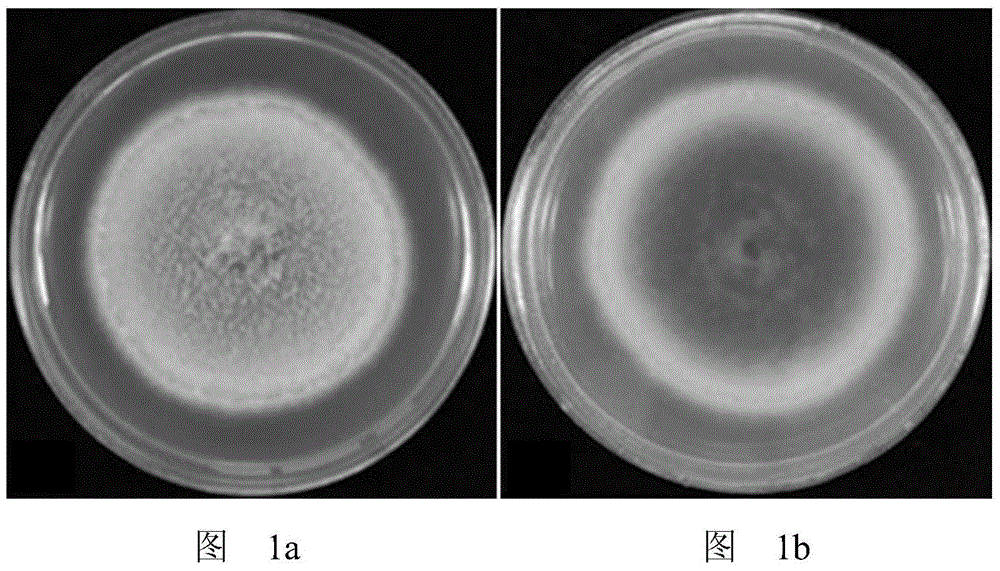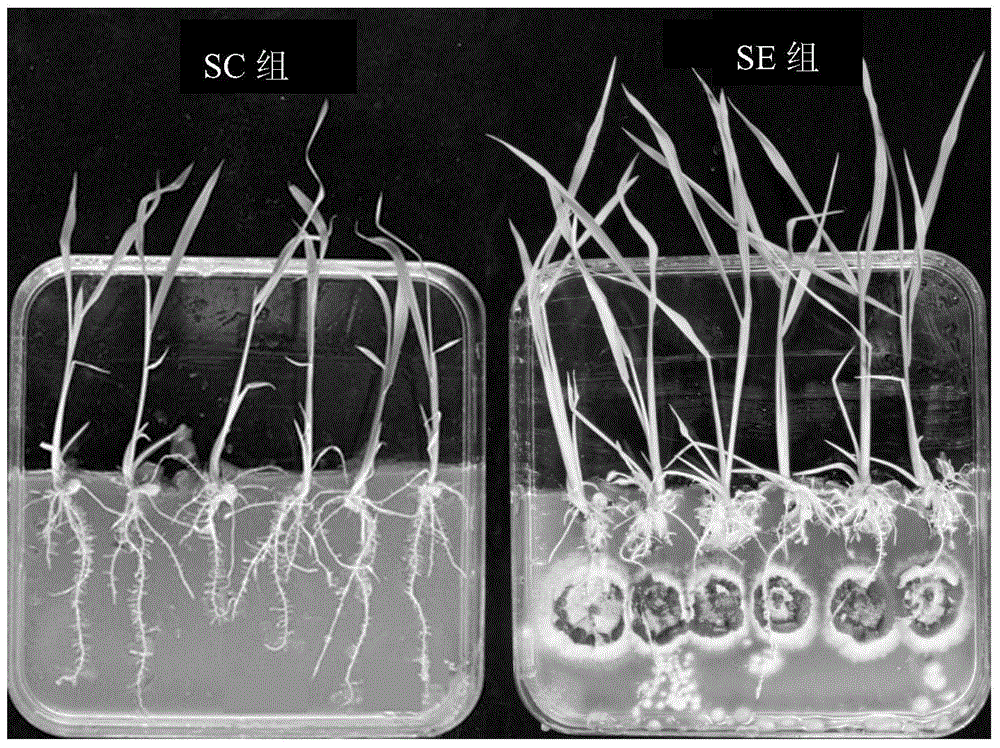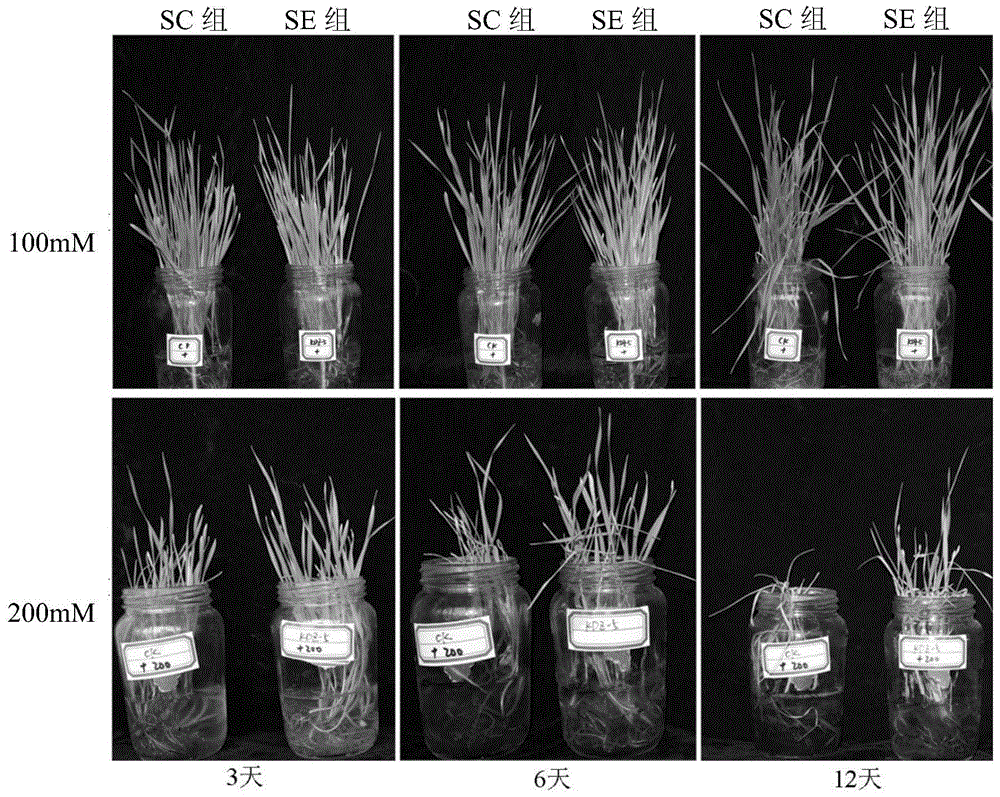An endophytic fungus of the genus Phoma and its application
A technology of endophytic fungi and Phoma, applied in the fields of application, fungi, microorganisms, etc., can solve problems such as unpublished research reports, and achieve the effects of improving resistance, increasing biomass accumulation, and delaying symptoms of salt damage
- Summary
- Abstract
- Description
- Claims
- Application Information
AI Technical Summary
Problems solved by technology
Method used
Image
Examples
Embodiment 1
[0031] Example 1 Isolation, purification and identification of strain KDZ-5
[0032] 1.1 Isolation and purification of strain KDZ-5
[0033] 1.1.1 Medium Preparation
[0034] ①Potato dextrose agar (PDA): Potato (peeled) 200g, glucose 20g, agar 20g, add distilled water and make up to 1000mL; bacteria 20min).
[0035] ②Water agar medium (WA): 15 g of agar, add tap water to dilute to 1000 mL; then carry out conventional high temperature sterilization (1.1 atmospheres, sterilization at 121° C. for 20 min).
[0036] 1.1.2 Strain isolation and purification
[0037] The KDZ-5 strain of the present invention is obtained in the laboratory under the following isolation and culture conditions, including:
[0038]Sophora japonica plant samples collected from the saline-alkali land in Aksu, Xinjiang, China, the plant samples were kept fresh and brought back to the laboratory. The plant samples were rinsed with tap water to remove the soil and appendages on the surface; after drying at ...
Embodiment 2
[0079] Example 2 Experiment on the effect of KDZ-5 on improving the salt tolerance of rice seedlings
[0080] 2.1 Medium preparation
[0081] ① Potato dextrose agar (PDA): the same as in Example 1.
[0082] ②MS medium: potassium nitrate 1900mg / L, ammonium nitrate 1650mg / L, magnesium sulfate 370mg / L, potassium dihydrogen phosphate 170mg / L, calcium chloride 440mg / L, manganese sulfate 22.3mg / L, zinc sulfate 8.6mg / L , boric acid 6.2mg / L, potassium iodide 0.83mg / L, sodium molybdate 0.25mg / L, copper sulfate 0.025mg / L, cobalt chloride 0.025mg / L, ferrous sulfate 27.8mg / L, Na 2 EDTA37.3mg / L, glycine 2.0mg / L, thiamine hydrochloride 0.1mg / L, pyridoxine hydrochloride 0.5mg / L, niacin 0.5mg / L, inositol 100mg / L, 30g sucrose, agar powder 7g, H 2 Make up to 1L with O; pH 5.6-5.8.
[0083] 2.2 Culture of strain KDZ-5
[0084] Pick the mycelial block of strain KDZ-5 with a sterile toothpick and place it on a PDA medium plate, seal it with a parafilm and place it in a constant temperature bi...
Embodiment 3
[0097] Example 3 Hydroponic test of KDZ-5 improving salt tolerance of wheat seedlings
[0098] 3.1 Medium and solution preparation
[0099] ① Potato dextrose agar (PDA): the same as in Example 1.
[0100] ② Potato dextrose liquid medium (potato dextrose liquid, PBA): PDA medium without agar.
[0101] ③Hoagland nutrient solution: calcium nitrate tetrahydrate 945mg / L, potassium nitrate 506mg / L, ammonium nitrate 80mg / L, potassium dihydrogen phosphate 136mg / L, magnesium sulfate 493mg / L, iron salt solution 2.5mL, trace elements solution 5mL, pH=6.0.
[0102] ④Iron salt solution: 2.78 g of ferrous sulfate heptahydrate, 3.73 g of disodium EDTA, 500 mL of distilled water, pH=5.5.
[0103] ⑤ Trace element solution: potassium iodide 0.83mg / L, boric acid 6.2mg / L, manganese sulfate 22.3mg / L, zinc sulfate 8.6mg / L, sodium molybdate 0.25mg / L, copper sulfate 0.025mg / L, cobalt chloride 0.025 mg / L.
[0104] 3.2 Preparation of wheat seedlings
[0105] After surface disinfection (70% ethano...
PUM
| Property | Measurement | Unit |
|---|---|---|
| thickness | aaaaa | aaaaa |
Abstract
Description
Claims
Application Information
 Login to View More
Login to View More - R&D
- Intellectual Property
- Life Sciences
- Materials
- Tech Scout
- Unparalleled Data Quality
- Higher Quality Content
- 60% Fewer Hallucinations
Browse by: Latest US Patents, China's latest patents, Technical Efficacy Thesaurus, Application Domain, Technology Topic, Popular Technical Reports.
© 2025 PatSnap. All rights reserved.Legal|Privacy policy|Modern Slavery Act Transparency Statement|Sitemap|About US| Contact US: help@patsnap.com



